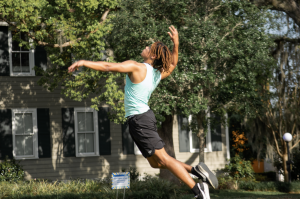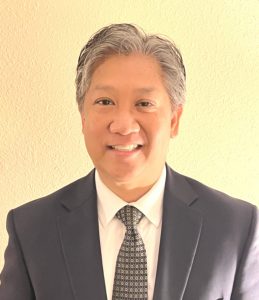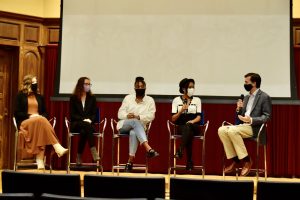![]() More than 30 students, faculty, and staff members attended the preparations of the Rollins Urban Farm this Saturday afternoon. A project started by Andrew Lesmes‘14, and heavily supported by EcoRollins, the urban farm will provide 11 raised beds for people who are interested in growing their own organic food.
More than 30 students, faculty, and staff members attended the preparations of the Rollins Urban Farm this Saturday afternoon. A project started by Andrew Lesmes‘14, and heavily supported by EcoRollins, the urban farm will provide 11 raised beds for people who are interested in growing their own organic food.
This is not the first raised beds initiative at Rollins College. Elizabeth Hall, where the EcoHouse is currently located, has one bed for the use of EcoRollins members. Prior to this current initiative, the Mowbray Sustainability House was a precursor for the idea, having hosted four beds during the house’s tenure. The space had to be demolished two years ago to host temporary classrooms during the construction of the Bush Science Center and, later, to provide a new parking lot by the Sutton Apartments.
Lesmes’ project, however, takes on an entirely new challenge as it aims to involve several different groups of the community. Oriana Reilly, class of 2017, is an active supporter of the project. As a sustainability coordinator and executive staff member of EcoRollins, she helps take care of the raised bed behind Elizabeth Hall. “Those raised beds are going to be open to the whole community. A person, a class, a professor, anyone can come to the coordinator of the garden, Andrew, and participate in the project,” said Reilly.
Lesmes used his senior project as an opportunity to develop the urban farm idea. With the help of one of his professors, Dr. Lee Lines from the Environmental Studies department, he created a comprehensive proposal that was quickly approved by the college. The inspiration for his project came from an off-campus endeavor.
“Over the summer I started interning with East End Market and I worked at the farm there. At that point, I started developing ideas for an urban farm for the Rollins campus,” said Lesmes.
His internship provided him with the guidance to set up the project, and the support of faculty and colleagues within Rollins helped him put his plan into action.
Saturday’s event showed that his efforts were not in vain. With the help of a $4,000 grant provided by Rollins, the construction of the urban farm began with the assistance of students, staff, faculty, and their family. The event, that was supposed to last from 12 to 3pm, ended early because of the hard work of the volunteers. Under the warm Florida sun, the volunteers from the community layed down compost to fill the raised beds and planted the first crops of lettuce and peppers.
The Sustainability House was unlocked to provide volunteers with access to the bathroom and cold water. “I picked the tomatoes and basil fresh yesterday. We used them for the bruschetta,” said Heather Schleiffer, class of 2015 and current EcoRollins president. She, as other members of the organization, are extremely enthusiastic about the new garden space and do not spare any expense to make the volunteers welcomed.
The urban farm project, and efforts such as the EcoRollins raised bed, shows the growing interest that Rollins has in organic farming and healthy eating. Sodexo has also identified itself as a supportive partner of the project, and some of the harvest will be sold back to the company to be served in the campus center.
The next big event for those involved with the urban farm is the late spring harvest, which will take place at the end of the semester. Lesmes and the members of EcoRollins hope that their urban farm efforts will influence the development of new raised beds in the future, not just at Rollins, but at other schools as well.
Lesmes’ goal is not only to provide the campus with organic and healthy produce. He sees the urban farm as an educational tool “founded on the Hamilton Holt liberal arts model that will provide the Rollins community with hands on learning opportunities.” Hopefully, the college community will make the best of this lucrative resource.













Be First to Comment